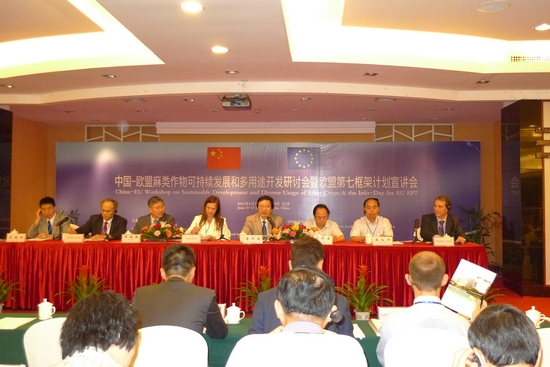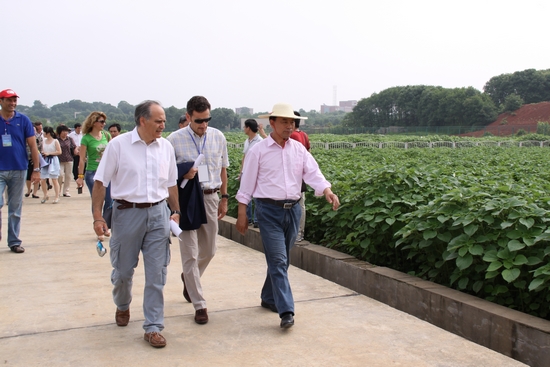分享到
China-EU Workshop on Sustainable Development and Diversity Usage of Bast Fiber Crops Held
The China-EU Workshop on Sustainable Development and Diversity Usage of Bast Fiber Crops and the Info Day for FP7, co-hosted by CAAS and the Directorate-General for Research and Innovation of European Commission and undertaken by the Institute of Bast Fiber Crops of CAAS, was held in Changsha from June 15th to 17th. Dr. TANG Hua-jun, Vice President of CAAS, Ms. Maive Rute, Director for Food, Agriculture and Biotechnologies in the DG Research and Innovation and officials from the Department of International Cooperation of MOST, the Delegation of European Union to China and the Department of Agriculture of Hunan Province attended and spoke at the workshop. Another 140 delegates from China and EU member countries participated in the workshop.
Rich in bast fiber corps, China is a top producer and trader of flax and ramie textiles. Considering the raw material production and the import and processing of fiber or the export of bast yarn and textile fabrics, China has truly become a major world producer of bast fiber and textiles. However, its bast fiber industries still face several problems: backward processing technology, low profit margin, few high-value products, single end product and heavy pollution, etc. Dr. TANG pointed out that the workshop complemented China-EU cooperation on agricultural technologies and the FP7 by focusing on bast fiber corps and had established a platform of communication for scientists from both sides. He hoped that the workshop would strengthen China-EU cooperation on bast fiber crops and deepen China-EU cooperation on agricultural technologies.
Ms. Maive Rute made a detailed presentation on Food, Agriculture and Biotechnologies under the FP7. Mr. XIONG He-ping, Director General of the Institute of Bast Fiber Crops of CAAS, Dr. CHEN Shou, Vice President of Hunan University and representatives from Wageningen University and other European research institutions delivered their reports respectively.

Opening Ceremony of China-EU Workshop on Sustainable Development and Diversity Usage of Bast Fiber Crops

Technical tour in Changsha
Rich in bast fiber corps, China is a top producer and trader of flax and ramie textiles. Considering the raw material production and the import and processing of fiber or the export of bast yarn and textile fabrics, China has truly become a major world producer of bast fiber and textiles. However, its bast fiber industries still face several problems: backward processing technology, low profit margin, few high-value products, single end product and heavy pollution, etc. Dr. TANG pointed out that the workshop complemented China-EU cooperation on agricultural technologies and the FP7 by focusing on bast fiber corps and had established a platform of communication for scientists from both sides. He hoped that the workshop would strengthen China-EU cooperation on bast fiber crops and deepen China-EU cooperation on agricultural technologies.
Ms. Maive Rute made a detailed presentation on Food, Agriculture and Biotechnologies under the FP7. Mr. XIONG He-ping, Director General of the Institute of Bast Fiber Crops of CAAS, Dr. CHEN Shou, Vice President of Hunan University and representatives from Wageningen University and other European research institutions delivered their reports respectively.

Opening Ceremony of China-EU Workshop on Sustainable Development and Diversity Usage of Bast Fiber Crops

Technical tour in Changsha
Latest News
-
 Apr 18, 2024Opening Ceremony of the Training Workshop on Wheat Head Scab Resistance Breeding and Pest Control in Africa Held in CAAS
Apr 18, 2024Opening Ceremony of the Training Workshop on Wheat Head Scab Resistance Breeding and Pest Control in Africa Held in CAAS -
 Apr 03, 2024IPPCAAS Co-organized the Training Workshop on Management and Application of Biopesticides in Nepal
Apr 03, 2024IPPCAAS Co-organized the Training Workshop on Management and Application of Biopesticides in Nepal -
 Mar 28, 2024Delegation from the School of Agriculture and Food Science of University College Dublin, Ireland Visit to IAS, CAAS
Mar 28, 2024Delegation from the School of Agriculture and Food Science of University College Dublin, Ireland Visit to IAS, CAAS -
 Mar 25, 2024Director of World Food Prize Foundation visited GSCAAS
Mar 25, 2024Director of World Food Prize Foundation visited GSCAAS -
 Mar 20, 2024Institute of Crop Sciences (ICS) and Syngenta Group Global Seeds Advance Collaborative Research in the Seed Industry
Mar 20, 2024Institute of Crop Sciences (ICS) and Syngenta Group Global Seeds Advance Collaborative Research in the Seed Industry
